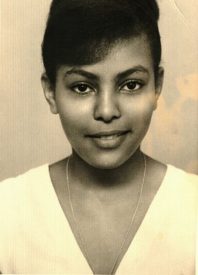
Finding Sally is a fascinating look at a woman’s search for her personal history. The documentary then connects that history to familial and national erasure. In searching for her titular missing aunt, director Tamara Mariam Dawit has a lot on her toolbox. Some of them include her four living paternal aunts and a then surviving paternal grandmother to help her out. But she also has her hurdles, like a dead estranged father who never told her about Sally. She confesses to one of her aunts, Menbere, that she didn’t know about Sally until she was 30. This is strange to Menbere who points out that Sally is in all of the photos. Scenes like this show the complexities of erasure.
Sally is not like most Ethiopian girls or women. She grew up upper class, a daughter of a diplomat. She went to schools that exposed her to political ideologies. If things went her way, those ideologies would radically change Ethiopia. A young woman like her would not think positively of then Emperor Haile Selassie. His censorship of the famines ravaging Ethiopia during the mid-1970s also enraged her. And this is when the erasure comes in, the kin that Dawit wants to combat. The family doesn’t see her radicalization as shameful more than it is sad. Her trajectory, like that of most of their class, is tragic. And it’s understandable for a nation to avoid discussing and reliving tragedy, one of many during that time.
Dawit uses a mix of talking heads and archive photos. Together, they’re not the most revolutionary methods to depict a revolution, which is fine. Her slow narration also doesn’t deliver the gravitas that the material needs. But it’s still emotionally affecting to see the effects of revolution and its countering movements. It’s important to remember, even in times like ours, that current generations aren’t alone in experiencing turmoil. History has faces, that some of its casualties had families and friends. That there is little distance between generations. That some people’s family members, like Sally and her father, faced and made difficult decisions. The interviews of her surviving aunts like Menbere, Kibre, Brutawit, and Tsion are great. They show a lack of resistance in hiding their histories, a relief for Dawit.
Finding Sally is more than just about that missing woman. The documentary includes a lot in its 78 minute running time. Some of these inclusions are footage of a modern Ethiopia, or Dawit depiction of how she follows Sally’s footsteps. Just like Sally, Dawit marries a man outside her class. Both men are partly the reasons why both women have found new connections to their heritage. The movie also balances its story of personal and historical impediments with moments of beauty. As Dawit shoots footage of her aunts, she does so lovingly, capturing their unconventional strengths. And she follows that same virtue when she occasionally turns the camera to herself. Discovering Sally’s story makes her live her life, a necessary message in these troubling times.
A part of Hot Docs At Home, Finding Sally premieres on April 30th. You can watch it through the CBC, CBC Gem, and the Documentary Channel,
https://www.youtube.com/watch?v=eQ-F22DRlxg
- Release Date: 4/30/2020

